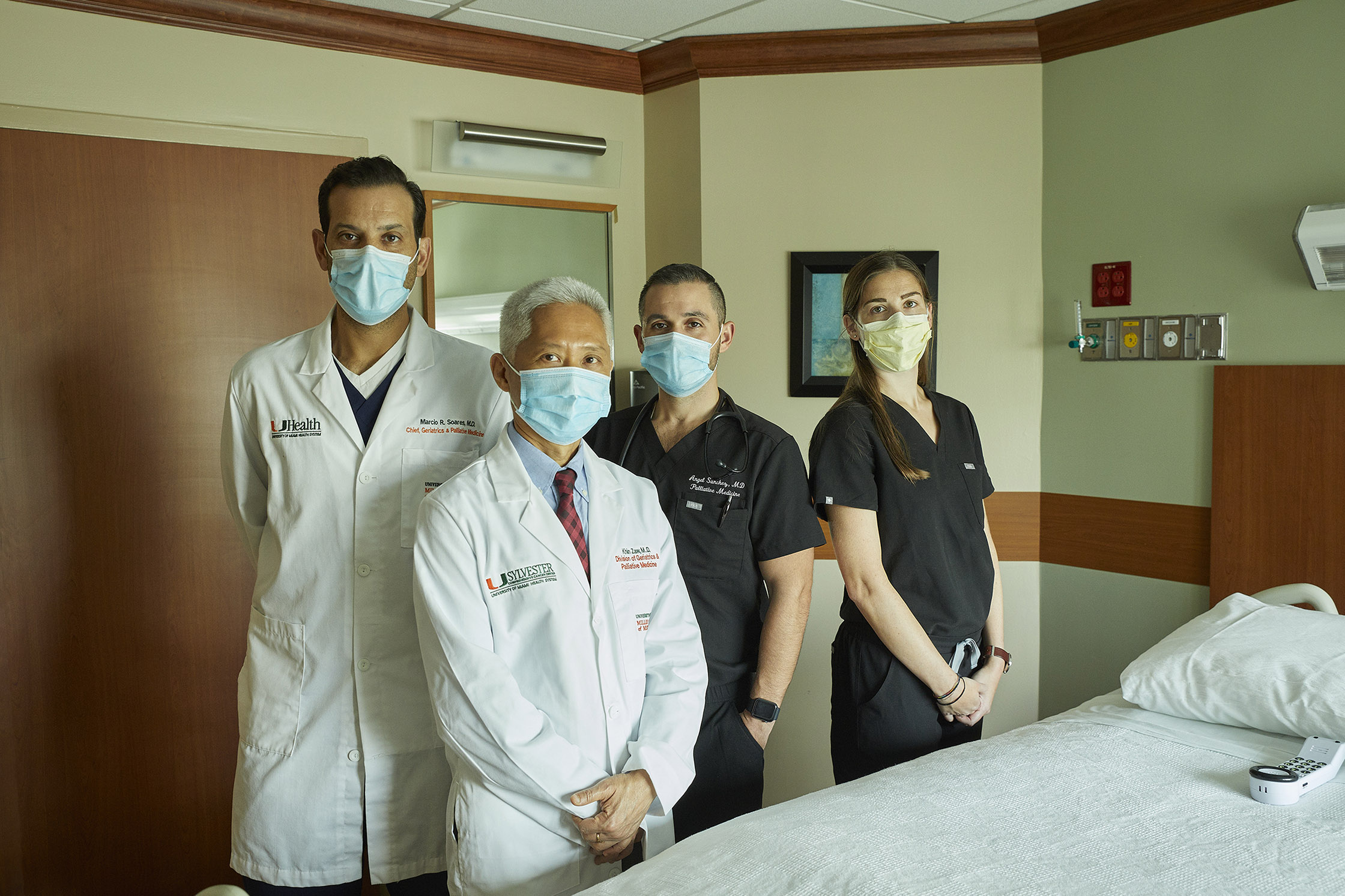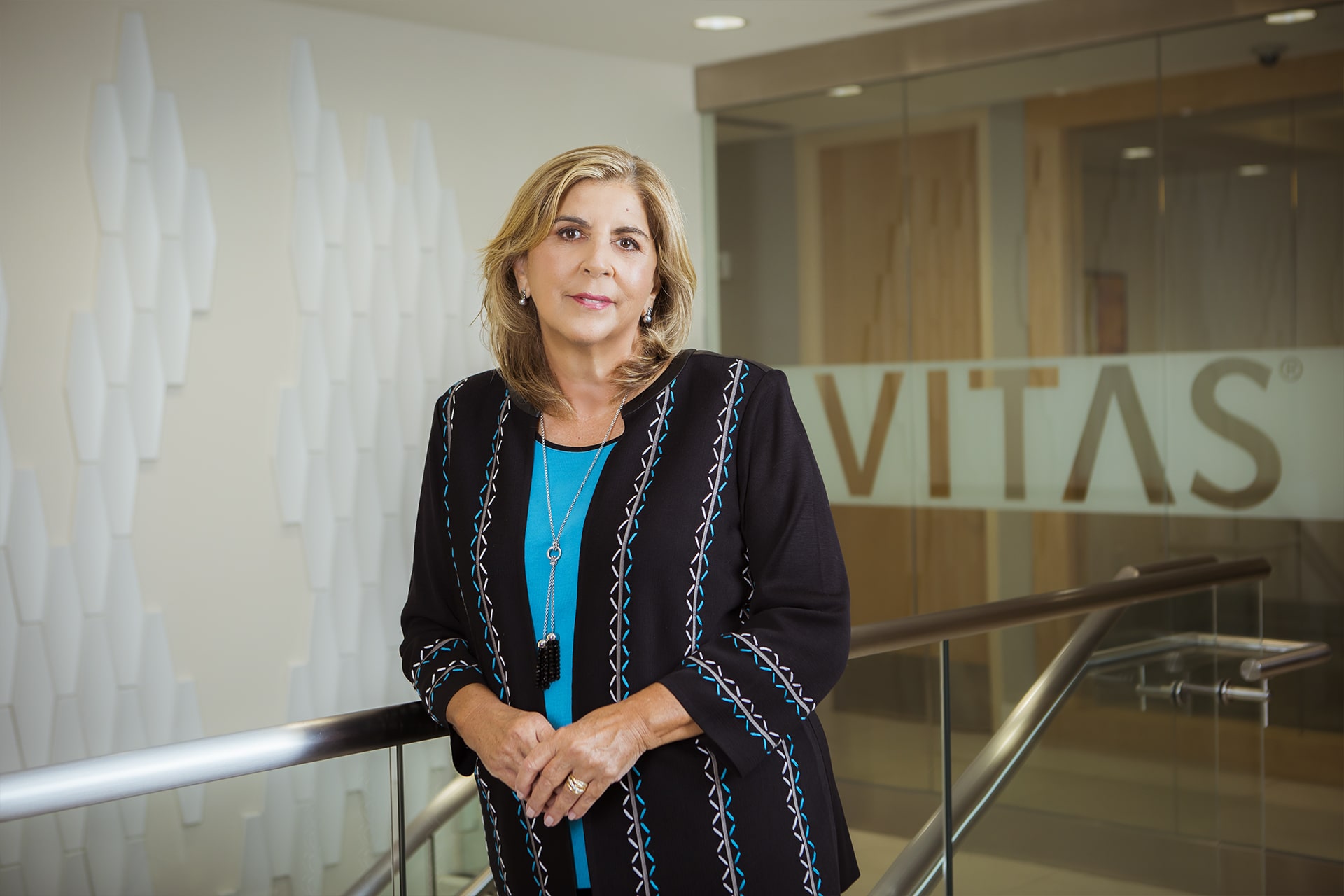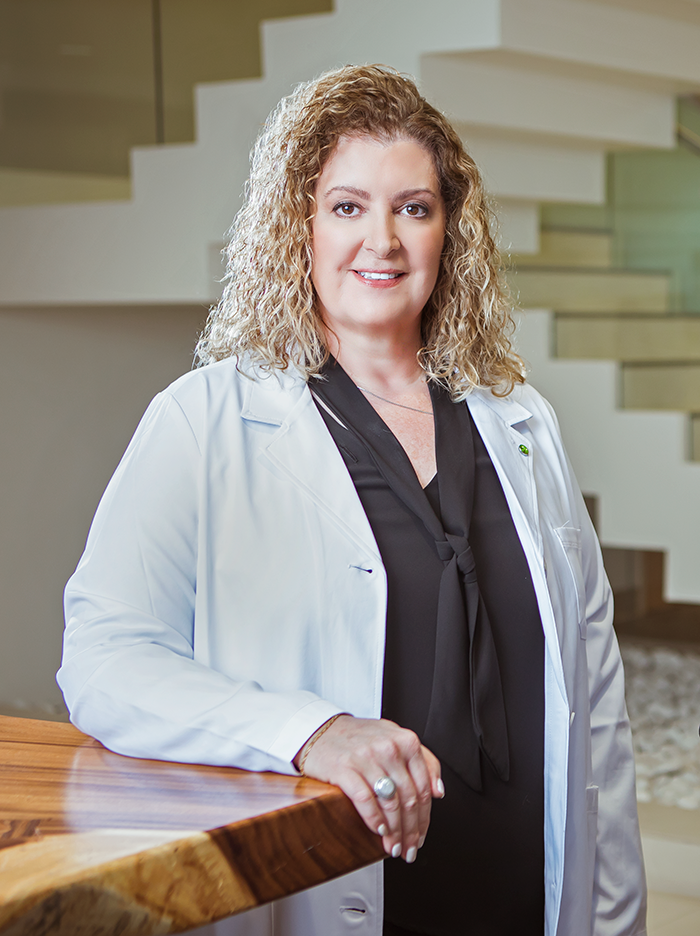Training the Future Leaders of Palliative Medicine
VITAS Healthcare’s partnership with the Miller School helps fill a growing need for end-of-life care
By Nastasia Boulos

From left, Marcio Soares, M.D., chief of the Division of Geriatrics and Palliative Medicine, Khin Zaw, M.D., program director of the Hospice and Palliative Medicine Fellowship Program, and fellows Angel Sanchez, M.D., and Orly Hadar, M.D. Photograph by Jeffery Salter.
A
growing movement in medicine in recent years has put a greater emphasis on hospice and palliative care, a medical specialty that aims to relieve suffering, provide comfort, and improve quality of life for people with serious, chronic, and life-threatening illnesses.
At the forefront of this specialty is VITAS Healthcare, the nation’s leading provider in end-of-life care. A pioneer in the hospice movement since 1978, VITAS provides compassionate hospice and palliative care that improves the well-being of both the patient and their family.
As part of a larger commitment to education and advancing the future of hospice and palliative care, VITAS Healthcare has served as a critical partner in funding and shaping the University of Miami Leonard M. Miller School of Medicine’s advances in this area, setting up an inpatient hospice unit at UHealth Tower and helping to establish the vision for, and to fund, the UM/Jackson Hospice and Palliative Medicine (HPM) fellowship program.
“We place a very high value on education,” said Betty Bel, vice president of operations for VITAS programs in Miami-Dade, Monroe, and Broward counties. “We feel that the better educated the medical community is, the better care patients will receive nationwide.”

Betty Bel
Photograph by Sonya Revell
An enhanced program
Now, with a renewed $575,000 commitment to the Miller School, VITAS is furthering what has become the largest palliative training program for physician-specialists in South Florida. The support will allow the Miller School to enhance its program with an additional focus on research and faculty development to continue attracting top candidates for fellowship positions.
“Ultimately, this leads to enhanced patient care, enhanced quality of care, and more appropriate referral in the institutions and communities where fellows are trained,” said Joan St. Onge, M.D., senior associate dean of faculty affairs, who was on the team that first launched the fellowship program. “This program helps expand access to palliative medicine specialists, increases research in the field, and benefits community in general.”
The HPM program was created in 2014 to fill a critical need for palliative care physicians. Currently, there are only an estimated 6,600 board-certified palliative physicians and 400 HPM fellowship spots, a number that prompts concern for the future. It is projected that there will only be one palliative medicine physician for every 26,000 patients by 2030.
However, in less than six years, HPM has become a hallmark training program in South Florida. Four new fellows join each year, one of whom completes a two-year, combined geriatrics-palliative medicine program (of which there are only six in the nation). The 15 graduates of the program have all gone to work as leaders in the field.
VITAS’ impact on palliative care at the Miller School goes far beyond the four fellows per year or a financial contribution — it extends to other health care providers and the community at large.
One family’s story
For Pamela Villalobos, whose parents both suffered from Alzheimer’s and lived in a memory care facility, VITAS hospice care was a lifeline. They provided expert care when her father’s health deteriorated and his eating, speech, and mobility were impaired, and later when her mother was diagnosed with COVID-19.
“VITAS provided an extra set of eyes and hands, and a level of care and support that we wouldn’t have had otherwise,” Villalobos said.
The VITAS staff, which includes a nurse, social worker, and chaplain on-site, worked to make her parents as comfortable as possible, whether through the proper equipment or even through music.
“The chaplain would come and sing with my dad, and my dad would try to sing along, and his eyes would light up,” Villalobos recalls. “Everyone was available to talk to at any time. I just can’t imagine people going through any kind of chronic illness or the end of life without having that support. It was such a gift.”
And, perhaps most important for Villalobos, VITAS always communicated clearly, providing the information and resources she needed to help her parents, and making sure that she was able to stay in touch with her mom in her final moments.
“The fact that I was able to be with my mom at the end and knowing that I could whisper in her ear as she took her last breath was so precious to me,” she said.
“VITAS’ ability to deliver care in a wide of array of settings, along with their level of outreach, has taught us how we can improve the way that we deliver care ourselves and how can we train our new physicians,” said Marcio Soares, M.D., chief of the Division of Geriatrics and Palliative Medicine at the Miller School.
Meeting clinical demand
The VITAS hospice inpatient unit has increased the university’s ability to meet the clinical demand for hospice and palliative medicine. Its dedicated expertise has led to an improved end-of-life-care experience for patients and their families and contributed to a growing awareness and knowledge of primary palliative skills.
“We’re committed to continuously seeing how we can improve the program and how we can interact more educationally with students,” said Ileana Leyva, M.D., regional medical director for VITAS Healthcare South Florida.
Ileana Leyva, M.D.
Photograph by Sonya Revell

Students round with VITAS physicians in the hospital and in home and nursing home settings, which expands their knowledge beyond the world of an academic, in-hospital setting. VITAS also routinely presents weekly didactics, sharing knowledge and skills acquired from more than 40 years in the field. Fellows then participate by educating peers, residents, and medical students.
VITAS’ support extends to UM’s School of Nursing and Health Studies, the Miami Herbert Business School, and the School of Education & Human Development.
“We try to educate the whole medical community so that we’re able to provide a comprehensive educational framework that becomes important to further our mission of providing the education of hospice and palliative care to our future caregivers,” Bel said.
“Thanks to VITAS, the University of Miami is able to continue its mission of improving the quality of education, clinical training, and research provided to our learners while meeting the increasing need for palliative and hospice care,” Dr. St. Onge said. “We couldn’t have done it without them.”![]()
Support palliative care at UHealth and the Miller School of Medicine today.


